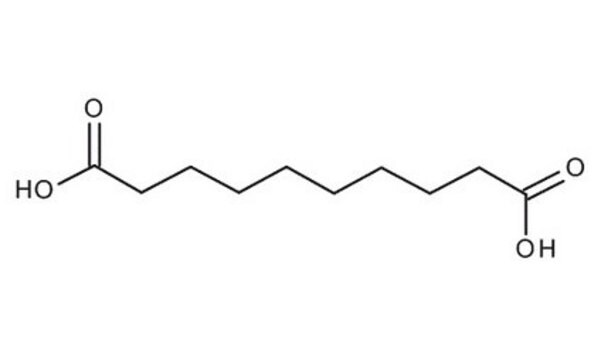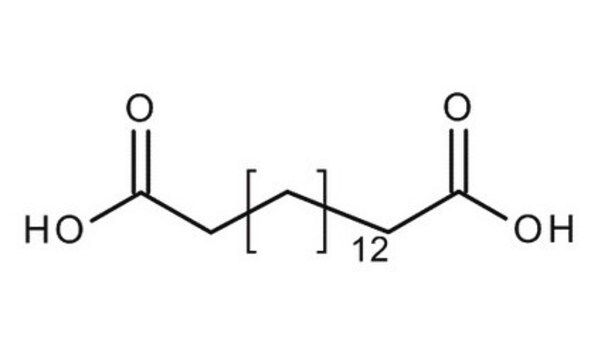All Photos(4)
About This Item
Linear Formula:
HO2C(CH2)8CO2H
CAS Number:
Molecular Weight:
202.25
Beilstein:
1210591
EC Number:
MDL number:
UNSPSC Code:
12352100
PubChem Substance ID:
NACRES:
NA.22
Recommended Products
vapor pressure
1 mmHg ( 183 °C)
Quality Level
Assay
99%
bp
294.5 °C/100 mmHg (lit.)
mp
133-137 °C (lit.)
solubility
ethanol: 100 mg/mL
ketones and ethers: soluble
SMILES string
OC(=O)CCCCCCCCC(O)=O
InChI
1S/C10H18O4/c11-9(12)7-5-3-1-2-4-6-8-10(13)14/h1-8H2,(H,11,12)(H,13,14)
InChI key
CXMXRPHRNRROMY-UHFFFAOYSA-N
Looking for similar products? Visit Product Comparison Guide
General description
Sebacic acid is a castor oil-derived dicarboxylic acid. It is widely used to produce polymers, plasticizers, lubricants, and corrosion retardants. It can act as a pH corrector in the cosmetic products formulations. Sebacic acid is also used as a precursor to prepare sebacate esters such as diisopropyl sebacate, diethylhexyl sebacate, and dibutyl sebacate.
Application
Sebacic acid has been used in the synthesis of:
- biodegradable and elastomeric polyesters [poly(glycerol sebacate)]
- novel bio-nylon, PA5.10
- novel temperature-response hydrogel based on poly(ether-ester anhydride) nanoparticle for drug-delivery applications
Storage Class Code
11 - Combustible Solids
WGK
WGK 1
Flash Point(F)
Not applicable
Flash Point(C)
Not applicable
Personal Protective Equipment
dust mask type N95 (US), Eyeshields, Gloves
Choose from one of the most recent versions:
Already Own This Product?
Find documentation for the products that you have recently purchased in the Document Library.
Customers Also Viewed
Juan Zhang et al.
Colloids and surfaces. B, Biointerfaces, 96, 56-61 (2012-04-21)
A novel temperature-response hydrogel was developed for drug-delivery applications. The hydrogel matrix (PES) was synthesized by melt polycondensation of poly(ether-ester) diacid based on PEG with low molecular weight and sebacic acid. The sol-gel-sol phase transitions of PES nanoparticle (NP) hydrogel
Stefanie Kind et al.
Metabolic engineering, 25, 113-123 (2014-05-17)
Polyamides are important industrial polymers. Currently, they are produced exclusively from petrochemical monomers. Herein, we report the production of a novel bio-nylon, PA5.10 through an integration of biological and chemical approaches. First, systems metabolic engineering of Corynebacterium glutamicum was used
Lena Vogt et al.
Materials science & engineering. C, Materials for biological applications, 103, 109712-109712 (2019-07-28)
Electrospun fibers based on combinations of poly(ε-caprolactone) (PCL) and poly(glycerol sebacate) (PGS) have been studied for applications in cardiac tissue engineering. The aim of the present study is to demonstrate the fabrication of PCL and PGS prepolymer or mildly crosslinked
Biodeterioration of synthetic materials-A brief review
Flemming H-C, et al.
Materials and Corrosion, 61, 986-992 (2010)
The plasticizer market: an assessment of traditional plasticizers and research trends to meet new challenges
Rahman M and Brazel CS
Progress in Polymer Science, 29, 1223-1248 (2004)
Our team of scientists has experience in all areas of research including Life Science, Material Science, Chemical Synthesis, Chromatography, Analytical and many others.
Contact Technical Service













